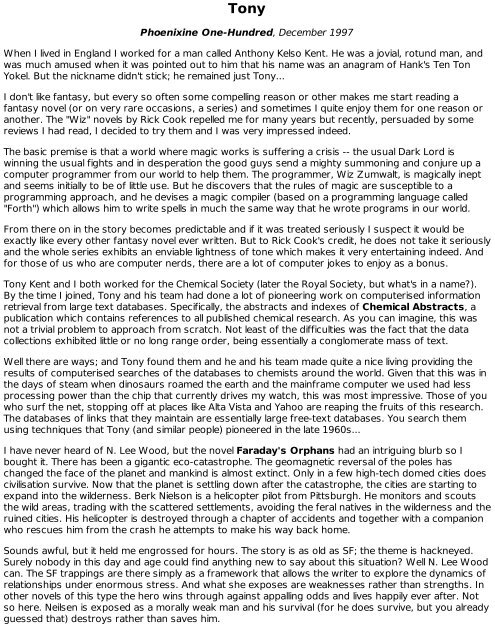Triffids Beard 2 - The Bearded Triffid
Triffids Beard 2 - The Bearded Triffid
Triffids Beard 2 - The Bearded Triffid
Create successful ePaper yourself
Turn your PDF publications into a flip-book with our unique Google optimized e-Paper software.
Tony<br />
Phoenixine One-Hundred, December 1997<br />
When I lived in England I worked for a man called Anthony Kelso Kent. He was a jovial, rotund man, and<br />
was much amused when it was pointed out to him that his name was an anagram of Hank's Ten Ton<br />
Yokel. But the nickname didn't stick; he remained just Tony...<br />
I don't like fantasy, but every so often some compelling reason or other makes me start reading a<br />
fantasy novel (or on very rare occasions, a series) and sometimes I quite enjoy them for one reason or<br />
another. <strong>The</strong> "Wiz" novels by Rick Cook repelled me for many years but recently, persuaded by some<br />
reviews I had read, I decided to try them and I was very impressed indeed.<br />
<strong>The</strong> basic premise is that a world where magic works is suffering a crisis -- the usual Dark Lord is<br />
winning the usual fights and in desperation the good guys send a mighty summoning and conjure up a<br />
computer programmer from our world to help them. <strong>The</strong> programmer, Wiz Zumwalt, is magically inept<br />
and seems initially to be of little use. But he discovers that the rules of magic are susceptible to a<br />
programming approach, and he devises a magic compiler (based on a programming language called<br />
"Forth") which allows him to write spells in much the same way that he wrote programs in our world.<br />
From there on in the story becomes predictable and if it was treated seriously I suspect it would be<br />
exactly like every other fantasy novel ever written. But to Rick Cook's credit, he does not take it seriously<br />
and the whole series exhibits an enviable lightness of tone which makes it very entertaining indeed. And<br />
for those of us who are computer nerds, there are a lot of computer jokes to enjoy as a bonus.<br />
Tony Kent and I both worked for the Chemical Society (later the Royal Society, but what's in a name?).<br />
By the time I joined, Tony and his team had done a lot of pioneering work on computerised information<br />
retrieval from large text databases. Specifically, the abstracts and indexes of Chemical Abstracts, a<br />
publication which contains references to all published chemical research. As you can imagine, this was<br />
not a trivial problem to approach from scratch. Not least of the difficulties was the fact that the data<br />
collections exhibited little or no long range order, being essentially a conglomerate mass of text.<br />
Well there are ways; and Tony found them and he and his team made quite a nice living providing the<br />
results of computerised searches of the databases to chemists around the world. Given that this was in<br />
the days of steam when dinosaurs roamed the earth and the mainframe computer we used had less<br />
processing power than the chip that currently drives my watch, this was most impressive. Those of you<br />
who surf the net, stopping off at places like Alta Vista and Yahoo are reaping the fruits of this research.<br />
<strong>The</strong> databases of links that they maintain are essentially large free-text databases. You search them<br />
using techniques that Tony (and similar people) pioneered in the late 1960s...<br />
I have never heard of N. Lee Wood, but the novel Faraday's Orphans had an intriguing blurb so I<br />
bought it. <strong>The</strong>re has been a gigantic eco-catastrophe. <strong>The</strong> geomagnetic reversal of the poles has<br />
changed the face of the planet and mankind is almost extinct. Only in a few high-tech domed cities does<br />
civilisation survive. Now that the planet is settling down after the catastrophe, the cities are starting to<br />
expand into the wilderness. Berk Nielson is a helicopter pilot from Pittsburgh. He monitors and scouts<br />
the wild areas, trading with the scattered settlements, avoiding the feral natives in the wilderness and the<br />
ruined cities. His helicopter is destroyed through a chapter of accidents and together with a companion<br />
who rescues him from the crash he attempts to make his way back home.<br />
Sounds awful, but it held me engrossed for hours. <strong>The</strong> story is as old as SF; the theme is hackneyed.<br />
Surely nobody in this day and age could find anything new to say about this situation? Well N. Lee Wood<br />
can. <strong>The</strong> SF trappings are there simply as a framework that allows the writer to explore the dynamics of<br />
relationships under enormous stress. And what she exposes are weaknesses rather than strengths. In<br />
other novels of this type the hero wins through against appalling odds and lives happily ever after. Not<br />
so here. Neilsen is exposed as a morally weak man and his survival (for he does survive, but you already<br />
guessed that) destroys rather than saves him.


